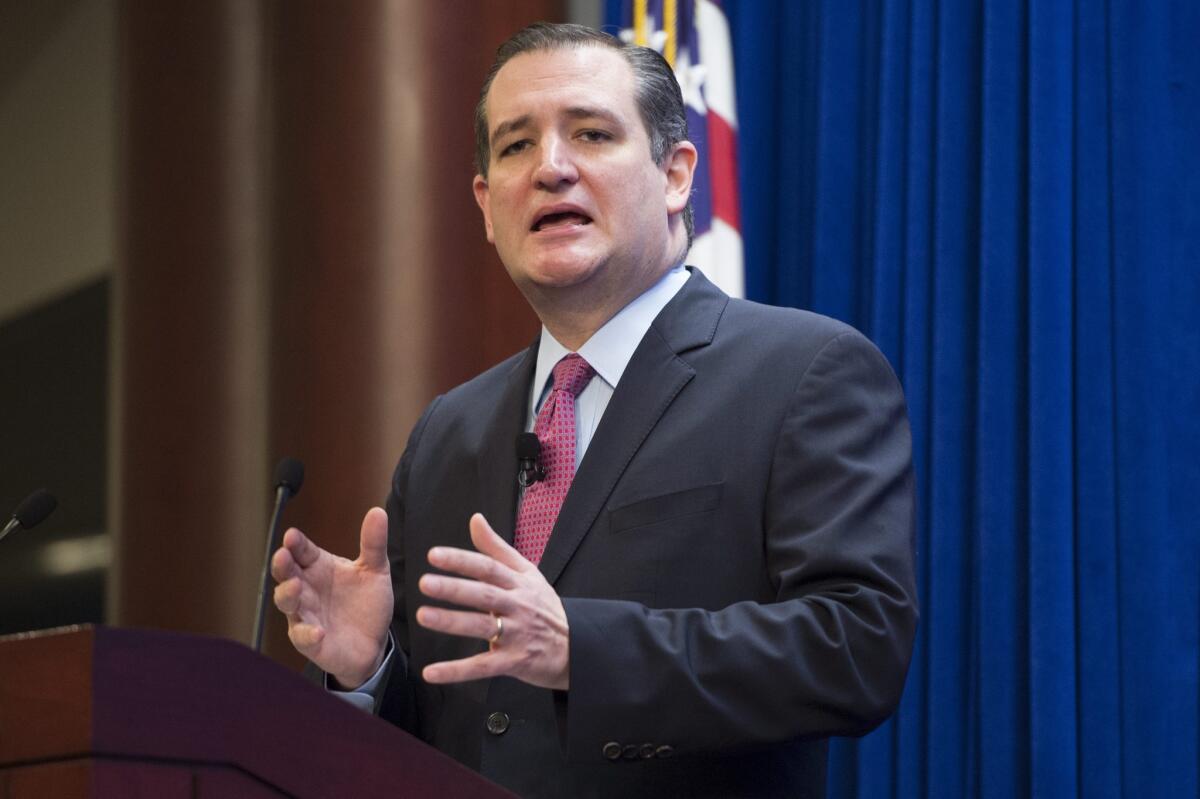Ted Cruz taps into disaffected conservatives’ anger in a bold play that just might work

Republican presidential candidate Ted Cruz delivers an address on protecting the nation from terrorism and his vision for foreign policy at the Heritage Foundation in Washington, D.C. on Dec. 10.
- Share via
All year long, smart Republicans have been whispering: Keep a close eye on Ted Cruz. He’s got a message that appeals to the party’s most conservative voters. He’s running a good campaign, well-organized and well-funded. He’s going to be a finalist — and he might just win the nomination.
Well, what do you know: Right on schedule, as voters in Iowa settle on their favorites, Cruz’s fortunes are looking up.
Beyond kind words [about Donald Trump], Cruz has tried to make himself palatable to the “Make America great again” crowd by veering to the populist right.
A Monmouth University poll released last week found Cruz in first place among Iowans who are the most likely GOP caucusgoers. In most national polls, which don’t mean as much, Cruz has risen to second place behind Donald Trump. The Des Moines Register said Cruz was “positioned to win.” And, last week, Iowa’s most influential Christian conservative, Bob Vander Plaats, gave Cruz his organization’s endorsement. Vander Plaats may be little-known outside Iowa, but he has picked the winners of the state’s last two GOP caucuses — Mike Huckabee in 2008 and Rick Santorum in 2012.
Wait, you say: Neither Huckabee nor Santorum won the Republican nomination, right?
That’s true. In past years, Iowa’s GOP caucuses, heavy with evangelical Christians, haven’t been a good barometer of sentiment among voters in other states.
But Cruz and his supporters argue that this time will be different. They believe anger at both President Obama and the Republican establishment is deep enough not merely to nominate an insurgent like Cruz, but also to enable him to win the general election in November.
They argue that in 2016, Cruz can mobilize millions of Christian conservatives who didn’t vote for Mitt Romney in 2012 — much as Obama mobilized millions of young and minority nonvoters in 2008.
“If the body of Christ rises up as one and votes our values, we can turn this country around,” Cruz told voters at a forum in Des Moines last month.
The Cruz camp also believes that Trump has energized another group of nonvoters — less devout, but equally angry over immigration and terrorism — who can be persuaded to switch to Cruz if the real estate mogul drops out.
Indeed, Cruz has been courting Trump and his followers unabashedly. Last week, when Trump called on the federal government to bar Muslims from entering the United States, Cruz refused to join the chorus of condemnation.
“I disagree with that proposal. I like Donald Trump,” Cruz told reporters. “A lot of our friends here have encouraged me to criticize and attack Donald Trump. I’m not interested in doing so.”
Cruz added: “I commend Donald Trump for standing up and focusing America’s attention on the need to secure our borders.”
Beyond kind words, Cruz has tried to make himself palatable to the “Make America great again” crowd by veering to the populist right.
In 2013, Cruz called for a dramatic expansion in the number of visas for high-tech workers from overseas, saying it would “create new jobs”; last month, he said he opposes any expansion for fear that foreign workers might take jobs away from Americans. Similarly, he once defended “birthright citizenship”; now he denounces it. As recently as April, he praised the Trans-Pacific Partnership, the big trade deal with Asia; after conservative groups dubbed the agreement “Obamatrade,” Cruz switched sides.
At this point, Cruz is the most conservative major candidate in the race — more conservative, certainly, than the ideologically squishy Trump. The senator from Texas is in favor of replacing the federal income tax with a flat tax of 10%, coupled with a federal sales tax of 19% — a plan that amounts to a huge tax cut for the wealthy, but a tax increase for many middle-class consumers. In a line that invariably draws cheers, he says he’d abolish the Internal Revenue Service.
On foreign policy, Cruz has denounced Obama for doing too little to fight Islamic State in Iraq and Syria, and he says his strategy would be to “carpet-bomb them into oblivion.” He told voters in Iowa: “I don’t know if sand can glow in the dark, but we’re going to find out.”
After the 2012 election, Republican National Committee Chairman Reince Priebus commissioned a list of recommendations for the party’s future. Foremost was a call for the GOP to reach out to new groups that hadn’t supported it in the past: above all, young people and minorities.
Cruz’s candidacy is a deliberate rebuke to that idea, a campaign that seeks not to broaden the GOP’s base of support, but to deepen it.
If he’s next year’s Republican nominee, it will be a test of an audacious theory, that a rigorously conservative candidate can lure millions of new right-wing voters to the polls — and avoid alienating too many moderates and independents in the process.
It’s hard to imagine that working. But Cruz has already succeeded in climbing to his party’s top rank. The nomination is not out of reach.
Twitter: @DoyleMcManus
Follow the Opinion section on Twitter @latimesopinion and Facebook
More to Read
A cure for the common opinion
Get thought-provoking perspectives with our weekly newsletter.
You may occasionally receive promotional content from the Los Angeles Times.







